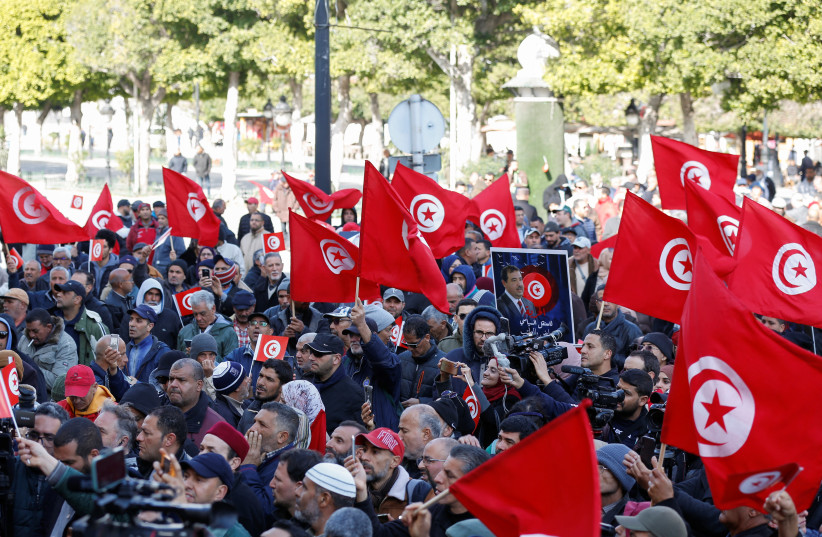A group of prominent Americans urged US President Joe Biden to cut assistance and impose sanctions on Tunisia in light of what they called a dramatic turn toward repression and authoritarian rule. Former diplomats, academics, and rights activists sent a joint letter to President Biden on Wednesday, arguing that it is the US’s role as a defender of democracy to “send a signal that there are real costs to democratic backsliding.”
For more stories from The Media Line go to themedialine.org
The letter stated that halting aid “can also signal to the opposition—as well as everyday Tunisians who are too afraid to speak out—that the US is watching, and not bankrolling their repression.”
The state of Tunisian politics
Tunisia is considered the only Arab nation that successfully transitioned into a democracy after the Arab Spring in 2011.
But in July 2021, Tunisian President Kais Saied declared a state of emergency, dismissed the government, suspended parliament, and ruled by decree for about a year until a new constitution that concentrated power in the hands of the president was approved in July 2022. Since then, the government has carried out various authoritarian-like actions such as detaining prominent figures from the opposition and judging them through military courts on charges of treason.

“Tunisia was seen by the West as a regional model, a democratic transition that deserved to be supported financially, diplomatically, and through security arrangements,” said Riccardo Fabiani, North Africa director at the International Crisis Group.
The European Union, Fabiani told The Media Line, has strong ties with Tunisia especially in the fields of economy and trade, as well as migration control. According to him, the US “plays a special role financially, thanks to guarantees it has given in the past on Tunisian bonds, and security-wise, through its collaboration with the army.”
Hamish Kinnear, a senior analyst specializing in the Middle East and North Africa at risk intelligence company Verisk Maplecroft External, added that international assistance to Tunisia became increasingly focused on security in the wake of a wave of terror attacks in 2015.
Kinnear believes that despite the campaign to pressure the Biden Administration to condition aid to Tunisia on democratic progress or to sanction Saied, such moves are unlikely. As to the US government’s perspective, he explained that “cutting security aid to Tunisia risks tipping the country into further chaos.”
Fabiani added that while the US is more critical of the current situation, Europe is interested in continuing to work with the Tunisian authorities, due to migration and stability concerns. That is why he questions whether hypothetical US sanctions on Tunisia would be effective in reversing its authoritarian turn.
“It remains unclear whether cutting aid and precipitating a social and economic crisis is the best way to restore democracy and guarantee stability in Tunisia, especially considering that European countries, such as Italy and France, are against such a move,” Fabiani said.
While sanctions or halting aid are not the most likely scenario, Kinnear believes that Saied’s actions could instead obstruct further development of Tunisia’s relation with the West.
“President Saied’s rollback of democratic freedoms inevitably creates complications for the country’s relations with the West by placing barriers on the deepening of political and trade ties,” he said.
As an example, Kinnear cited the case of the United States’ past consideration to designate Tunisia as a major non-NATO ally on the basis of “shared values” and “Tunisia’s democratic gains.” However, he continued that “this is now unlikely due to the president’s growing authoritarianism.”
Fabiani pointed out that the authoritarian drift that began in July 2021 “has removed the main reason for this extraordinary support and cooperation, which had been agreed upon at the 2011 Deauville G8 summit, and has created an embarrassing situation for the West,” he said.
The Group of Eight (G8), which includes Germany, Canada, the US, Russia, Japan, France, Italy, and the UK, had a summit in the aftermath of the Arab Spring, where, among other motions, it decided to launch an enduring partnership with Tunisia and Egypt promoting their “transition to democracy and tolerant societies,” according to G8’s website.
“Tunisia is no longer the democratic model for the region, but it is following a familiar route toward dictatorship,” Fabiani said.
An IMF loan of $1.9 billion to Tunisia’s struggling economy has been on the negotiation table for months. The issue seems stalled due to the North-African country’s refusal to comply with the reforms that the government should implement in accordance with IMF conditions in order to go through with the loan.
Fabiani says that this might be related to the US’s possible decision to cut aid.
“A lot will depend on the IMF deal. If Tunisia accepts implementing its reforms, which looks increasingly unlikely, that would be a signal of cooperation,” he said. However, he explained that if Tunisia continues to refuse and heads towards an economic crisis, and if repression continues to intensify, the US will likely be spurred to action.
